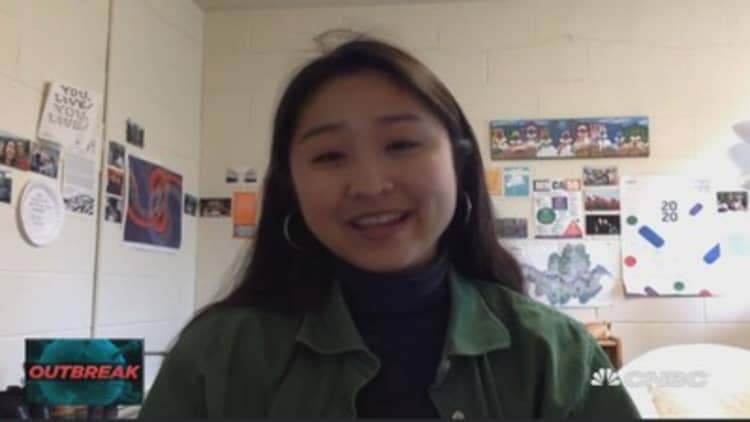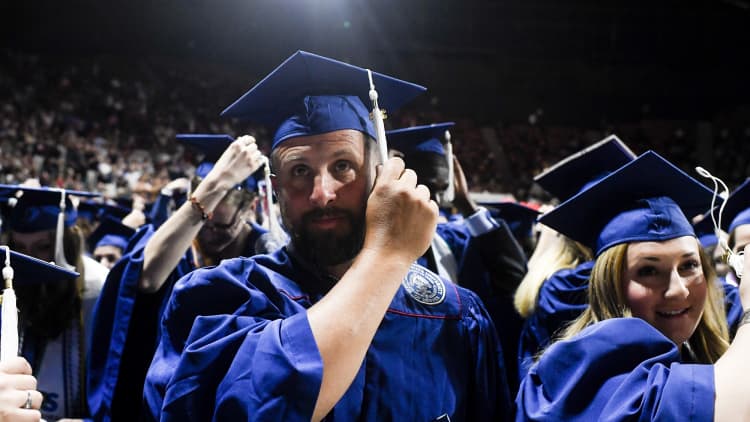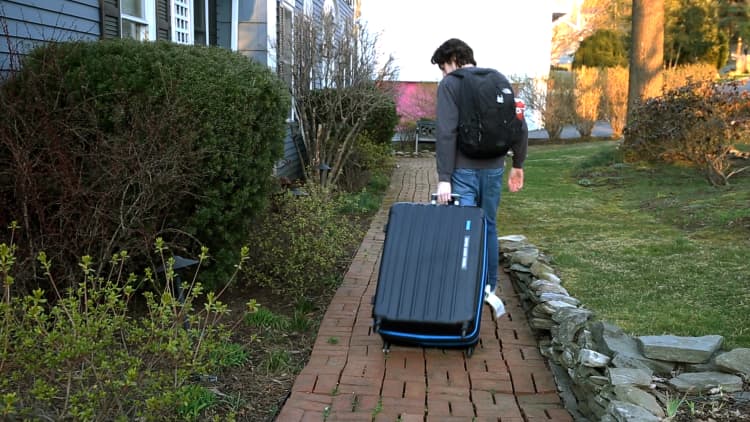Around the world, communities are taking drastic measures to curtail the spread of coronavirus. For many colleges and universities, that means canceling events, closing dorms and dramatically disrupting the lives of students and faculty.
To date, at least 1,102 colleges and universities in the U.S. have closed their campuses due to coronavirus, choosing to move classes online. Georgetown professor Bryan Alexander estimates that college closures have impacted over 14 million students. "At least," he stresses.
While students, professors, administrators and public health officials agree that school closures will play an important role in limiting the transmission of coronavirus, this bold move is causing a ripple effect throughout the higher education community.
CNBC Make It spoke with over a dozen college students to hear how coronavirus is impacting them.
College closures
On March 7, The University of Washington became the first large university in the U.S. to close its doors because of coronavirus. The school canceled in-person classes for its nearly 50,000 students and is having students take their exams remotely.
Soon after, schools across the country followed suit.
While each school has confronted coronavirus differently, many of the students Make It spoke with mentioned a typical pattern: rumors, followed by emails from administrators, followed by panic — despite the school administrators' best efforts.
"It all escalated really quickly," Isabella Borshoff, a graduate student from Australia earning a master's degree in public policy at the Harvard Kennedy School of Government, tells CNBC Make It,
"I think the Kennedy School was one of the first Harvard schools to announce that it was planning to pilot online courses," she says. "And they'd framed it as 'Just in case we need to go online after spring break, we're going to test our capacity to deliver our courses online via Zoom.'"
About a week later, on March 10, Harvard announced the entire university would be going online and gave students five days to evacuate their dorms.
"It kind of went from 'We're just testing' to, 'Okay, this is the real deal' pretty quickly," says Borshoff.
Michael Robertson, a senior at Davidson College, learned from a professor that the school was closing. "I was sitting in my professor's office hours trying to work on a math problem when a different professor came out and shouted, 'That's it, it's over! [You're] going home! Classes are remote,'" Robertson says. "I think I spent about 10 more minutes trying to solve the problem I was working on before the gravity of the situation started to sink in."
"It sort of created an end of the world feeling," he says.
Logistical difficulties
As students were forced to leave campus, many faced logistical difficulties as they suddenly had to scramble to pack their things and find a new place to live if they couldn't just return home.
Aaron Vanek, a junior studying at New York University's Tisch School of the Arts, left New York with the understanding classes would resume on April 19. Instead of going home to Minnesota, where a family member was being tested for coronavirus, he decided to go to his roommate's home in Maryland. Travel considerations also played a part in his decision — his roommate's father agreed to make the five-hour drive from Maryland to pick them up, but Vanek had no way to get home to Minnesota.
Later, NYU informed students they would need to clear all of their belongings from their dorms, which meant Vanek had to travel back to New York, find a place to store his belongings and find a way to get home.
Some schools, like Davidson, have provided additional support to students during this rocky transition, offering free shuttle rides to the airport and refunding students for the remaining cost of their room and board.
Brandon Harris, a Davidson sophomore, says the Dean's Office is helping cover the transportation costs of students in need and the school's student government purchased two large storage lockers for the student body to use free of charge. Davidson alumni created a Google Doc listing the air miles they have collected so that students in need can use them to buy airplane tickets home.
Other schools have made exceptions for students who cannot easily travel.
At Stanford, "the only undergrads that were allowed to stay on campus were international students, students who have suppressed immune systems and other students who are homeless or who don't have a home to go back to," Robin Fierberg, a senior at Stanford University, tells CNBC Make It.
Exacerbating inequalities
Indeed, for students who are housing or food insecure, school closures have made these issues even worse, as they struggle to find alternative living situations.
"The long-term effects are kind of hard to know, but in general, when you have vulnerable populations and emergency hits them, it tends to make their life situation worse. Just as a sort of general statement. And so I think overall, that's what we're going to see," Eddy Conroy, associate director of research communications for the Hope Center for College, Community and Justice tells CNBC Make It.
Conroy fears that students who were struggling to stay in college before the pandemic will drop out completely.
"If colleges don't figure out how to support those students, they might lose them permanently," he says.
An entirely new educational experience
Perhaps the biggest change to the lives of college students has been to their educational experiences.
"I can already tell from just the three or four Zoom classes that I've had that they're not going to be the same quality of education that I'm used to and that I came to school for," says one college student who wishes to remain anonymous due to concern about losing an on-campus job. "If you're in a 200 person lecture and one person forgets to mute themselves, then that's just like chaos."
Trey Rogers, a senior at Harvard, says he is skeptical of how his virtual classes using Zoom video conferencing services will compare to the small discussion-based classes he is accustomed to.
"It's really hard to think that this is not the end of our academic year because this Zoom thing feels a little bit like a last-minute fix for a problem that is not that easily fixed," he says.
And because the nature of their education has changed, many students are asking for their money back, including close to 10,000 students at NYU who have signed a petition calling for partial tuition refunds.
"I think it's fair to ask for at least a partial refund on classes, just considering the huge drop in quality," Olivia Bornstein, a junior at Boston University, tells CNBC Make It.
Indeed, students like Bornstein are still paying big prices for an online education product that typically costs less, that researchers believe is less effective and that students and professors find less valuable.

The senior class of 2020
School closures have had a significant emotional impact on students — especially those set to graduate this year.
"It sucks a lot, I think, for people who are seniors," says Fierberg of his fellow graduating classmates. "I had to say goodbye to a lot of my friends much quicker than I thought I would have to, and under much different circumstances. It's unclear whether there will be a commencement ceremony."
"I find solace in the idea that this is something that probably every college senior in the U.S. is going through in one way or another," he adds.
"I realize that it's probably the right thing for [Harvard] to do and to be especially safe," Rogers says. "But it's devastating as a senior to know that I have to abort my college experience on this really sad note."
Job prospects
College students, and seniors in particular, are focused on their professional lives after college and are now preparing to enter the workforce during a recession.
"A lot of people are talking about what it's gonna be like graduating into a recession, which is what it's looking like," says Borshoff.
Cheryn Shin, a senior at Wellesley College majoring in English and creative writing, says she has spent the past few months looking for a full-time job to start after graduation. But because of the pandemic, her job search has become even harder.
"It feels like even fewer companies are looking to hire," she says. "I was told that [majoring in] the humanities was all about luck and timing, so it felt like a slap in the face because it feels like I have neither of those."
Overall optimism
Despite all of this — college careers cut short, financial difficulties and professional woes — the students CNBC Make It spoke with remain remarkably resilient. One may even describe them as optimistic.
"I've heard the terms 'optimistic nihilism' thrown around a lot," says Bornstein. "I think that people kind of find their way to be happy considering that we, you know, we're entering the second recession that I've witnessed in my life."
"We just need to remember that we're not the only ones and this is a temporary inconvenience, we'll push through and we'll be OK," says Harris.
Check out: The best credit cards of 2020 could earn you over $1,000 in 5 years
Don't miss:




